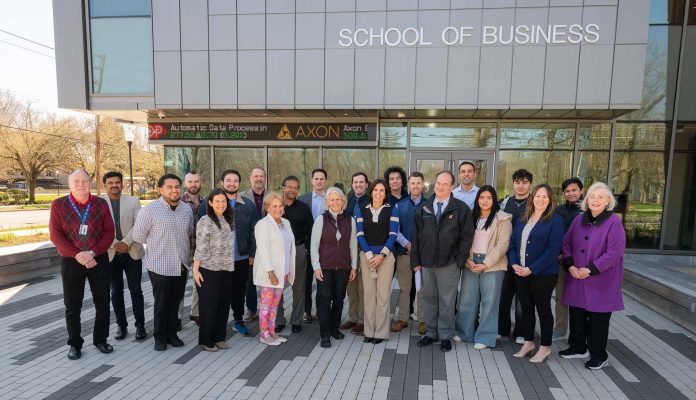To prepare students for careers in the ever-evolving energy and utility industries, a new bachelor’s degree program in Energy and Utility Leadership will launch in fall 2025 in the School of Business. The only such degree program in New England, it was created in collaboration with industry partners from the energy and utility sectors and regulatory bodies, who met during 2023-24 to guide the program and shape its curriculum. Southern’s new program replaces the Public Utilities Management Concentration in the Business Administration degree program.
“We asked industry stakeholders what skills and information they needed in employees, and how students can make themselves more marketable to them. They gave us a laundry list of courses,” said Dr. Carol Stewart, professor of management, who is program director. “There’s no similar undergraduate program in New England, where many universities offer a course, but not a full degree program.”
The timing couldn’t be better. “It all started when the former president and CEO of the Regional Water Authority, Larry Bingaman, told us a large number of current employees will retire soon. We need to train people now. Our new business school dean, Dr. Jess Boronico, really got the ball rolling,” noted Stewart, who is also director of student affairs at the School of Business.
Classes will include Current Issues in Energy and Utility Leadership, Workforce Development in Sustainability, Public Sector Economics, Finance and Budgeting, Contract Negotiations in the Energy and Utility Sectors, plus more on climate change issues, consumer safety, energy in transportation, grid infrastructure, setting rates and environmental law and justice. Some courses will be taught by industry leaders, and some companies will offer internships to students in the program.
“With about 40 percent of current utility workers in the U.S. eligible for retirement within the next five years, there’s an immediate need to rebuild the utility workforce and for utilities to grow their applicant pool so they can continue to operate at the high level customers expect from them,” said Sunder (Sunny) Lakshminarayanan, Regional Water Authority (RWA) interim president and chief executive officer.
Increasing automation and digital transformation in the field means it’s crucial that new hires have up-to-speed technical ability, especially due to the loss of valuable institutional knowledge as a result of retiring employees.
Graduates will gain a strong understanding of both domestic and global energy needs and leave with the skills to succeed in many areas of the energy sector, including oil and gas, land negotiations, energy finance, trading, commercial/project development, and consulting.
The advisory group of industry partners included executives from RWA, Eversource, Avangrid (a sustainable energy company), AT&T, Connecticut Public Utilities Regulatory Authority, Vistra (an electricity and natural gas utility) and The Metropolitan District Commission (a nonprofit municipal corporation that provides drinking water and wastewater treatment to the Hartford region), among others.
As an example of a unique program tied to industry needs, the new Energy and Utility Leadership program is highlighted at all School of Business admissions events. At a recent Women in Energy Leadership conference in Mystic, Stewart attended to network with attendees, and Southern sponsored a table offering materials on the program.
Stewart, a full-time faculty member at Southern since 2012, graduated from Southern with a bachelor’s degree in 1998 and a master’s degree in 2003. Her Ph.D. is from Regent University in Virginia.
Southern is a charter member of the national Climate Change Leadership Committee for universities. Its School of Business building is the first net-zero-energy building built by the state of Connecticut, which means that in a year, the amount of energy the building produces equals the amount it expends.
For more information about the program, contact Carol Stewart at stewartc1@southernct.edu.


